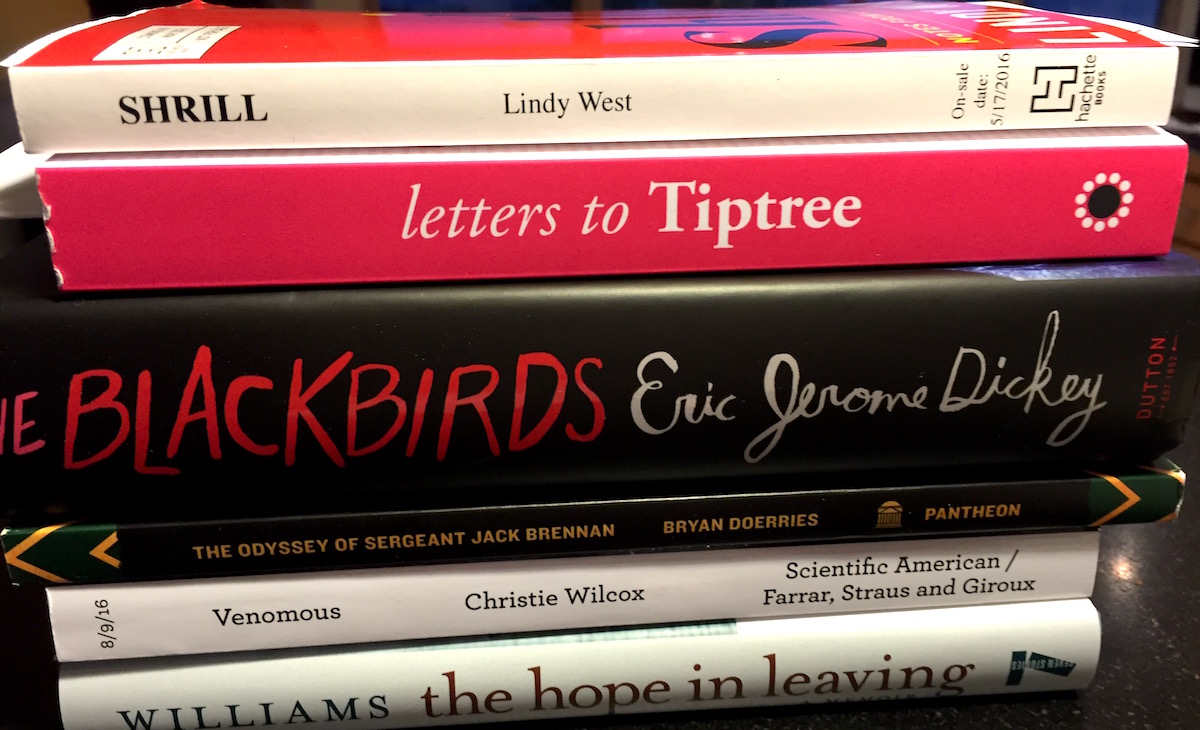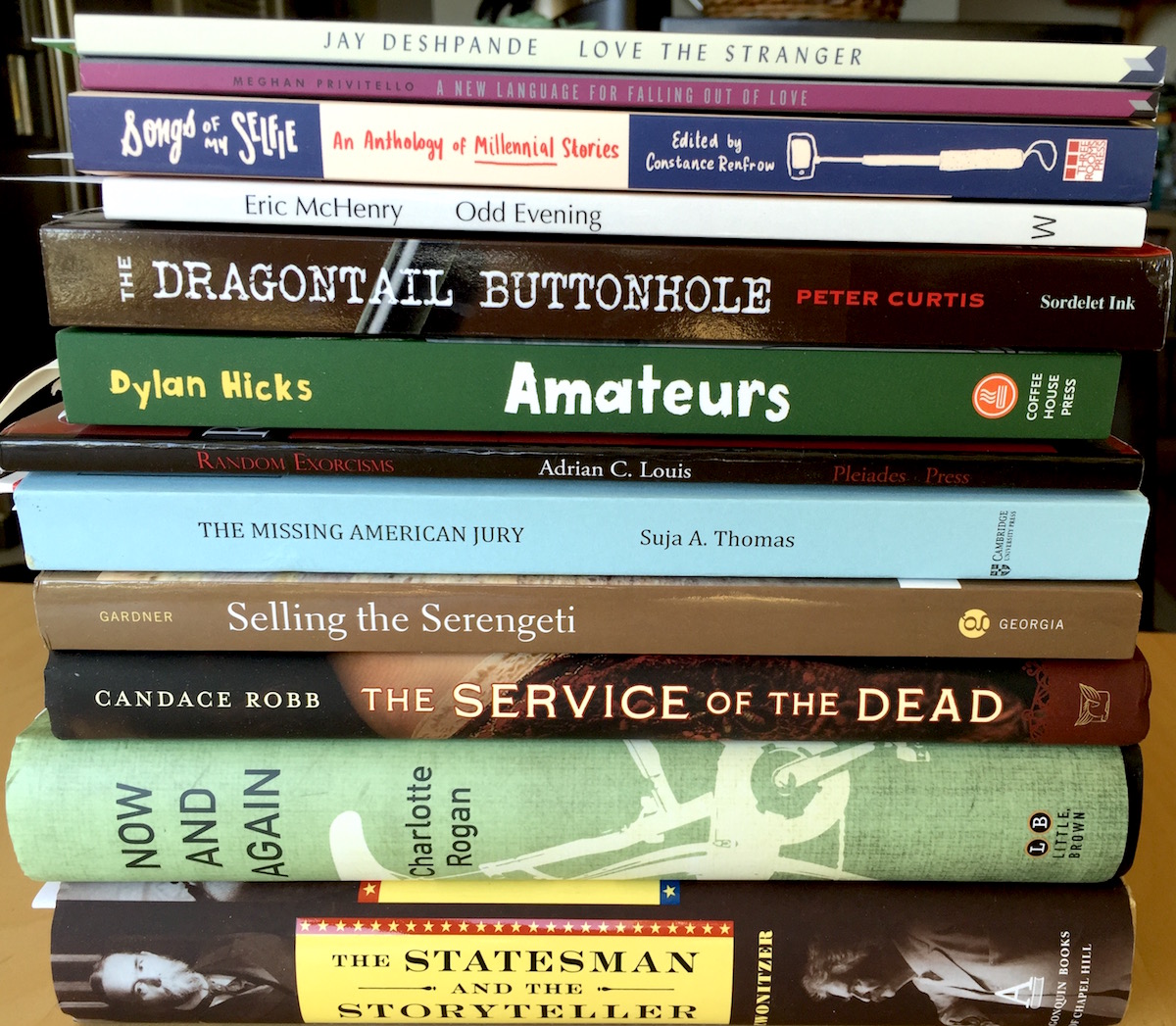Notes from the Field - AWP 1.5
Correspondant Rachel Kessler agreed to be our eyes-on-the-ground at the AWP festival this year. Join us for her daily updates as the conference unfolds. Comics here are from Gabrielle Bates, used with permission.
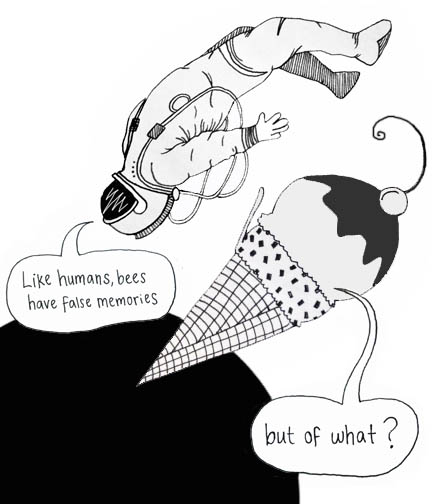
Trotting down Figueroa Street this morning I saw a young and healthy-looking woman crouched behind a concrete planter. Her head bent nearly between her legs, AWP lanyard flapping behind her in the wind like a terrified bird trying to escape, I noticed she was shaking. I approached, concerned — was she ill? had she fallen? — and saw her notes trembling in her hands. Her lips moved, either in prayer or rehearsal. This panic attack technique seemed to be working for her, as she appeared able to inhale and exhale her cigarette, so I let her be. I have assumed this same position before panels, and childbirth, and I did not need anyone touching my shoulder in a neighborly way in those moments. What I needed was the Emily Dickinson Quiet Space, open from 8:00 am to 5:30 pm in room 507, which I was not able to find.
I began the day at the book fair, where all of my favorite small presses offered extremely tempting discounts on books. Soon, my tote bag bristled with titles, digging painfully into my shoulder. It was time to sit down. Fortunately, there was an excellent and entertaining panel, “The Poetry of Comics,” featuring Bianca Stone, Alexander Rothman, and the multi-talented Seattleites Gabrielle Bates and Catherine Bresner.
“Come join us!” Bianca Stone began her reading with this invitation. You can watch Bianca Stone’s video of her poetry comic “Because You Love You Come Apart” here, but seeing this work in its original poem comic form is essential. She described her process as collaging great lines from poems that didn’t work, an exercise in editing. “Poetry comics are great for understanding your own work. Once you cut it out and stick it in a box, you can really see if that line fails,” she said. “Because You Love you Come Apart” begins with her rendering of an iconic Batman image. A few panels later the poem reminds us “but this is also your life made with your clumsy hands,” lettered in the speech bubble of a long-haired, suit-jacketed hot air balloon operator. Poetry comics, or “poïc cometry” as Alexander Rothman put it in his insightful manifesto, ask “what else can language and the visual do?” These poets and visual artists are not animating a poem. A grad student attending this talk inventively used eyeliner to outline her schedule while the poets read their poetry comics out loud and showed slides of these poem-comics. Gabrielle Bates showed “We Are All Arachnes.” She spoke about the visual creating its own thread, as this poem demonstrates:
I think about the act of weaving a lot
the body as both motion and yarn
but what is our loom?
The past?
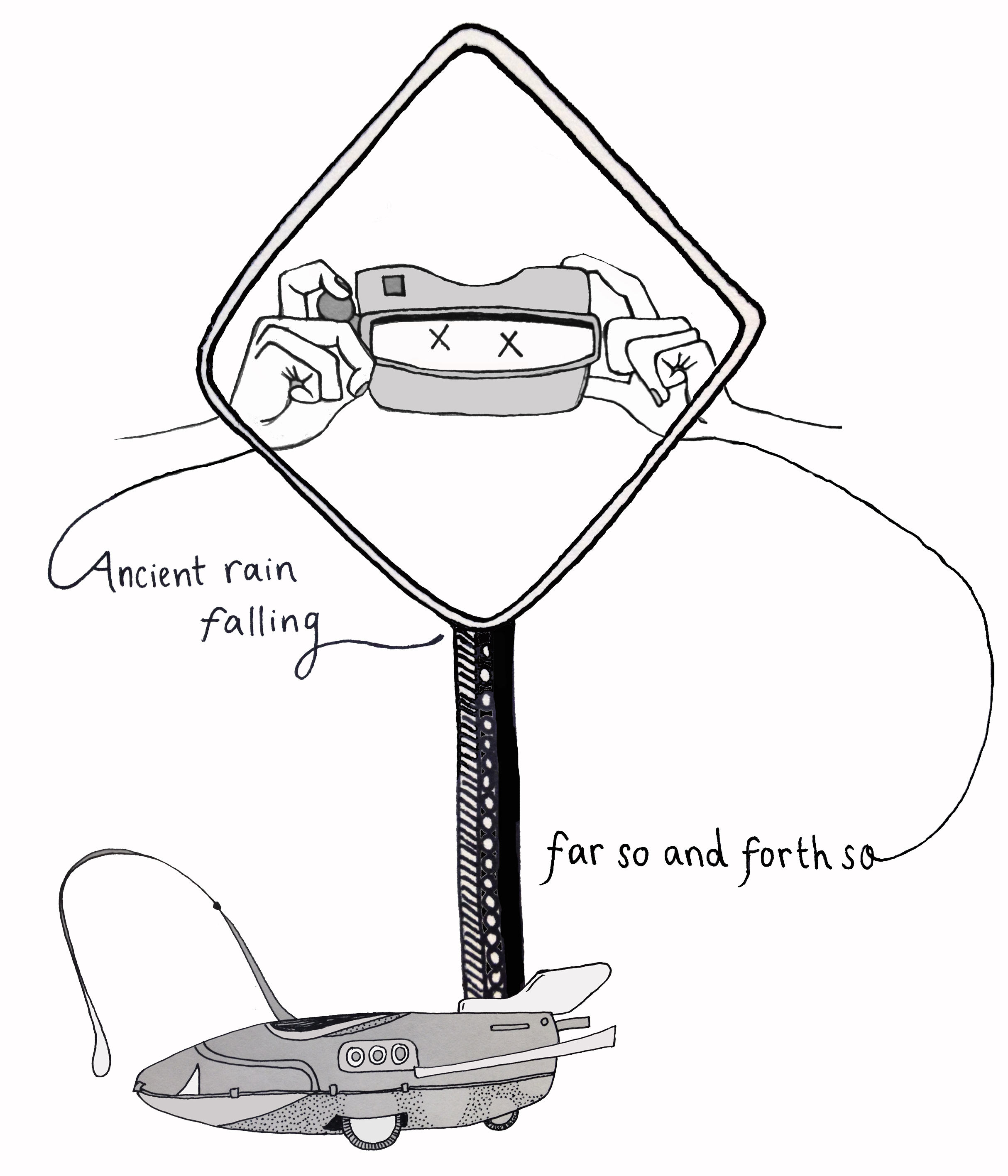
Catherine Bresner read her erasure and digital collage poems. She writes in her poem comic “The Empty Season,” (published by BOATT journal) “I hate people who answer questions with answers / I would like to be a scientist of all things […] Please shut up for a minute / & look / the window washer fencing his sky double.” Suddenly there is an image of Susan Sontag lounging large on top of a bullet train. The poem concludes with a hand-drawn panel of a hand holding a card that reads “The End,” in the spirit of Mary Rueffle. Check out Ink Brick and Gigantic Sequins for more poetry comics.
Why does AWP continually underestimate attendees interest in panels that discuss hiphop? All 300 seats were filled, with many more sitting in aisles, standing in the back and crowding around the doors for the panel on “The Literary Genius of Kendrick Lamar.” Jostling outside the room, it was difficult to hear, but I caught snippets of Natalie Graham’s talk drawing parallels between Lamar’s “These Walls” and James Baldwin’s essay “Uses of the Blues” and novel “Giovanni’s Room” to discuss “the anarchic vitality of the human interior.” She summed up so much with this brilliant line: "so, journalists caught all the holy ghosts of Blackness when To Pimp a Butterfly came out."
The microclimates of AWP merit comment. Vast windowless rooms of sparsely attended readings are aggressively air-conditioned, requiring layering sweaters and jackets and scarves, while the smaller packed rooms were as hot as a summer Sunday in church, sweating writers knelt and beat conference planners against the warm air. It is essential to pack clothing for a 30 degree range of temperature. The absence of drinking fountains stood out in sharp contrast with the proliferation of cocktail bars within the conference center. Is this a feature of LA life?
Perhaps there is a gap in AWP’s awareness of pop culture, but the next panel I attended, “From Writing as Craft to Minecraft” was similarly humid and packed. The staid format of panels and readings in the overly florescent-lit conference center was upended by marketing-savvy presentations dripping with education-speak. One presenter, Mark German, a former teacher turned curriculum developer, blasted note-scribbling attendees with three video game trailers. Especially notable was Never Alone, a game made in collaboration with First Nation Alaskans, narrated in Iñupiaq with English subtitles, demonstrating a possible future for oral tradition. We go on a quest with an arctic fox, and on the way learn about the environment, culture and tradition of this place.The main thrust of this panel was pedagogical: engage students in video game creation, andvoila! they are collaborating and story-telling.
Back at the book fair, a booth promoted The Call Me Ishmael Phone, “a literary device that helps people celebrate and discover great books,” which is an old-timey-looking payphone-style receiver where users punch a button that triggers audio recordings of people describing a memory of their first encounter with a favorite book. What I really wanted at this point was an old fashioned phone booth to duck inside of and slide its door shut. Then a manual typewriter caught my eye, and I met a woman, Jacqueline Suskin, who composes poems for people on it. She calls this project Poem Store, and claims to make a decent living doing it. She does not keep copies of the poems she writes. Many years ago I co-founded a similar performance art collaboration with Sierra Nelson and Sara Paul Ocampo tapping out poems on demand, and we kept carbon copies of thousands of poems we’ve typed since 1998. I continue to be fascinated by the typewriter’s inky, percussive power and the work these machines inspire.
The Help Desk: Give me back my damn books, mom
Every Friday, Cienna Madrid offers solutions to life’s most vexing literary problems. Do you need a book recommendation to send your worst cousin on her birthday? Is it okay to read erotica on public transit? Cienna can help. Send your questions to advice@seattlereviewofbooks.com.
Dear Cienna,
My aunt and I are avid readers and tend to trade books back and forth. If my mom (her sister) is there when my aunt returns one of my books and hears us talking about it, she always says "sounds interesting, can I borrow it?" But every time, sure enough, if I stop by my mom's house, the books are sitting in her front door staging area... you know, the spot where she puts things that she wants to remember to take with her when she leaves. She will keep my books for up to 3 months then return them and admit she "never got around" to reading them. The last time she did this I said "Mom, let's cut out the middle man here"...and I wouldn't let her borrow them. My aunt thinks I should apologize. What do you think?
Georgina, Federal Way
Dear Georgina,
I met a woman once – let's call her Jaustiny – whose mother sat her down at the tender age of 14 and told her that she was leaving the family to go find herself. Not only was she tired of being a mother, she'd decided that she really liked the name Jaustiny so she was legally changing her name to the name she'd bequeathed on her daughter. Then New Jaustiny peaced out to San Francisco, bought herself new tits and realized her dream of being a childless waitress/artist named Jaustiny with sexy breast-induced back issues. The psychological mindfuck of that aside, her mother's new identity created a lot of weird burdens in Original Jaustiny's life as she grew up – her mother developed a criminal record stemming from a brief career as a meth chef and had most recently stolen OJs identity and ruined her credit by buying matching Harleys for herself and her new boyfriend, all of which OJ had to account for.
OJ told me this story at a bbq. Ten feet away stood my own mother, who was evaluating some cowboy she'd just met for the quality of his sperm (for me. Always for me). As I watched her inspect his gums for disease I thought, "that old broad ain't so bad."
Your complaint is that your mother borrows books that you and your aunt have already read but she doesn't read them, correct? How does this actually impact you if you've already read the books? Your mom wants to feel included in the conversations and closeness you share with your aunt but she sucks at the follow-through. That is a harmless annoyance stemming from love.
Be sweet to your mom. Apologize. Let her borrow all the books she's guaranteed to never read and be thankful she's not a Harley-riding meth chef named Georgina.
KISSES,
Cienna
Portrait Gallery: Lesley Hazleton
Each week, Christine Marie Larsen creates a portrait of a new author for us. Have any favorites you’d love to see immortalized? Let us know
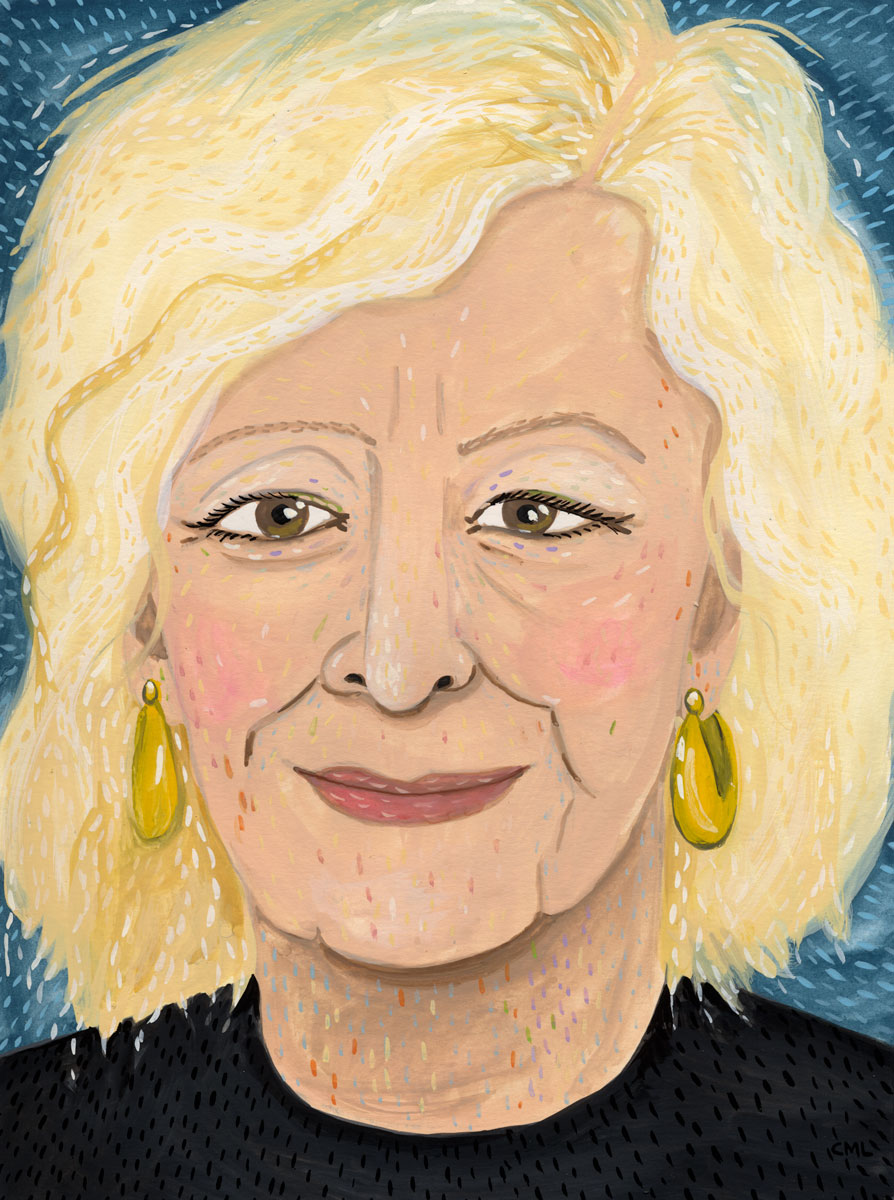
Seattle treasure Lesley Hazleton appears at Town Hall Tuesday, April 5th.
Notes From the Field: Day 1 of AWP
Correspondant Rachel Kessler agreed to be our eyes-on-the-ground at the AWP festival this year. Join us for her daily updates as the conference unfolds
The AWP, which stands for Association of Writers and Writing Programs, is the big annual literary conference that takes place in a different city each year. This year it is happening in downtown LA, right next to the Lakers home court. The three-day conference includes readings, panel discussions, pedagogy talks, educator caucuses, and countless offsite events, like poetry pool parties, as well as a sprawling bookfair with hundred of authors signing. It is where writers go to geek out on the cognitive science of story, the poetry of comics, intersectional queer poetics, and formal prosody.
When I attended the conference in Seattle two years ago, I experienced the usual dread of an introvert in airless conference rooms and questioned what the hell I was doing there. (This year, there is a panel for that: “In Case You Think You Don’t Belong Here: Imposter Syndrome and AWP” at 10:30 a.m. on opening day). But I found I enjoyed dipping into the crush of 10,000+ writers arrayed in their spectrum of eyeglasses and disappearing in the crowd. Riding down the three-story span of escalators with thousands of writers and watching thousands of writers riding up next to me, I understood in a profoundly physical way that my writing didn’t matter. I felt like an ant marching forth from the colony in formation with my multitudinous fellows. Smiling, or grimacing in claustrophobia-induced panic, gossiping and arguing about rhyme, gripping our tote bags or obsessively thumbing our thick conference program books, we were all there because we write and read and teach and care about literature.
This year I arrived in Los Angeles and realized I brought all the wrong clothes — it is colder than Seattle right now and quite windy. Angelenos on the street are wrapped in wool hats, scarves and puffy jackets. En route to the bunker-like conference center, I ducked into H&M to panic shop, and I think I saw Claudia Rankine doing the same. She had several fun print dresses picked out and that look in her eyes. (She’s giving the keynote address tonight, opening night.) After picking up my badge and 250 page program, I ran into Liz Bradfield, poet and naturalist from Cape Cod, on the street. I got invited to eat steak with Stanley Plumly in a revolving rooftop bar, which seemed impossibly far away, but not as far as the DJ-ed dance party with hot tubbing some associates invited me to. After all the long blocks of walking and cacophony of 20-story video screens, I am exhausted and return to my shopping mall hotel that appears to be modeled on a nuclear reactor, radiating concrete and confusion like the Death Star.
Open Call for a Public Diversity Editor
The Seattle Review of Books is looking for a freelance Public Diversity Editor. Since that's a term we just made up, we should probably explain what it is.
We're two white guys. One of our goals with the site was to try to do a good job with representation, to create a site that reflects the diversity of the literary community. We thought one way to guard against us succumbing to our own unconscious biases would be to hire an outside person to check our work and report back to our readers.
This will be a role that periodically holds our feet to the fire by writing a semi-annual column for our site that explains what we do well, and points out where we can improve.
This includes diversity in:
- The people we hire to write for us, and
- The people we write about.
We'd prefer that this be a person we don't know, whose work shows a dedication to awareness, education, and who can write well on these subjects. Of course, you'll be paid for this work — likely akin to the amount we pay for a review, but possibly more if the work involves charts or other statistical considerations.
Your work will be published on the site, with editing only for clarity, grammar, and stylistic compatibility. You'd see any changes before publication.
If this is something you're interested in, email us: diversity at this domain. Please include writing samples, and a brief overview on why you are right for the role.
The Joyce Maynard reading we selected as tonight's best literary event has been canceled due to an illness in Maynard's family. We hope to see her again in Seattle soon under better circumstances.
Thursday Comics Hangover: The Superman trick
In case you were staring out at sunny skies and planning what to do this weekend, let me just make one thing abundantly clear: Batman V Superman: Dawn of Justice is every bit as terrible as you’ve heard. It is not so-bad-it’s-good. It’s just bad: inept, crass, soulless, mean-spirited, and dumb. Don’t pay money to see it.
But this isn’t another review of that movie (the world doesn’t need any more of those) and it’s not another middle-aged white dude whining about his childhood being stolen from him (the world didn’t need one of those). Instead, I want to talk particularly about one commonly held belief: the concept that Superman is hard to write. If you Google the phrase “Superman is hard to write,” you’ll get over 2.6 million results, featuring articles with titles like “The Difficulty of Writing Superman” and “3 Reasons It’s So Hard to Make Superman Interesting.” This idea is absolute bunk, and I’ll explain why.
Here it is: A good Superman story is an inward-facing story. The conflict in a Superman story is almost never external. In fact, they’re almost always internal. Everyone imagines that Superman is hard to write because he’s invulnerable, and super-strong, and has super-senses, and so on and on and on. That doesn’t matter. When you’re writing a Superman story, you’re not trying to find his toughest opponent, or his most difficult physical challenge. None of that stuff—super-speed, laser beams—matters at all. Instead, you’re trying to challenge the idea of morality.
The greatest era of Superman comics were the books edited by Mort Weisinger in the 1950s and 1960s. It’s where most of the core Superman concepts came into being, and it’s where the greatest Superman comics of the modern age (the ones written by Alan Moore and Grant Morrison) found their inspiration. And if you read any Superman story from that time, you’ll find that very little of the plot has to do with Superman fighting anything.
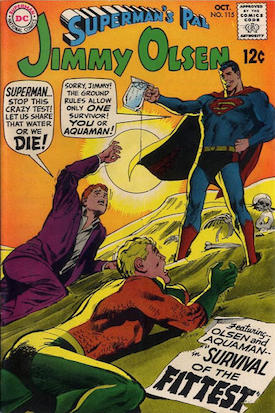
Think about the strange ideas those comics delivered on a regular basis: Superman. Supergirl. Beppo the Super-Monkey. Bizarro Superman. Superman Red and Superman Blue. Superboy. Comet the Super-Horse. Streaky the Super-Cat. The Legion of Superheroes. You could easily argue that there were no characters in Superman comics aside from Superman himself; everyone else was a reflection of his psyche and an exploration of his themes. It’s as interior as a Beckett novel.
The over-literal interpretations of Superman that followed the Weisinger years are to blame for making Superman boring. The New 52 reboot of Superman has never been interesting. John Byrne’s sad attempts to create sci-fi justifications for Superman’s powers were about as fun as counting each individual piece of gravel in a driveway.
At least the much-reviled Death of Superman storyline, which many blamed for launching the comics bubble that almost destroyed the superhero industry in the 1990s, delivered four different Superman characters to comics, including a new Superboy and John Henry Irons, who was later known as Steel. The creators of those comics understood that Superman was only compelling when his basic goodness was reflected and distorted onto other personas.
So listen: Nobody cares about how much Superman can lift, or how hard he can punch, or whether he can beat Batman in a fistfight. The trick is this: think about the most decent person you can. Put pressure on that person. Imagine what would happen if that person happened to be, say, from the poorest one percent of the USA, or from a part of the world ruled by a tyrant, or raised by an Objectivist. What happens then? Is he still good? What if he’s in a situation where he has to confront a mistake he’s made? How does he behave then? What happens next?
Novelist Jonathan Franzen will be appearing on Celebrity Jeopardy with a number of other luminaries including Louis CK, Anderson Cooper, Al Franken, Melissa Harris-Perry, Lara Logan, and Chuck Todd. If Louis CK cleans Jonathan Franzen's clock on Jeopardy!, I will die a happy man.
Book News Roundup: How do you say "longlist" in Urdu?
Shelf Awareness reports that local book distributor Partners/West is closing. The Renton office will stop delivering books on April 1st. This is a huge bummer; it means that local bookstores in need of rush titles will have to rely on Ingram, the largest book distributor in the country. Though most bookstores try to order direct from publishers whenever possible because the discounts are better, distributors are the best way for bookstores to get books in a hurry. Booksellers turn to distributors when a book breaks big on NPR, for instance, or when a customer needs a special order. As an indie bookstore customer this news probably won't affect you directly, but it does mean that local bookstores have one less option for getting books, which could create larger problems down the line. As comic book stores have learned, having one major distributor for your product can be problematic.
Looking for a good new translated book to read? The Best Translated Book Award 2016 longlist for fiction has been announced. At 25 books long, it's a bit excessive, but there's something to be said for having a nice long shopping list at the ready for the next time you go book shopping.
Eight thousand library jobs in the United Kingdom have disappeared over the last six years, reports the BBC. This is terrible news for British library-goers, but speaking selfishly, it's a relief to read that this isn't America for once.
The Comics Journal published a long interview with Underworld artist Kaz, by Seattle cartoonist Peter Bagge. My favorite bit?
Yes, back in the day we were just called weird. Nerds were into science and such. I never thought of myself as a nerd. Geek makes more sense. My friend Jim Ryan called us Lowlife Scum.
The 2015 VIDA Count Is In
Every year, VIDA "examine[s] race and ethnicity, gender, sexual identity and ability" by counting the demographics of literary institutions like awards and magazines. Their 2015 Count examines literary magazines and review outlets, and the news is...[drumroll]...at least partially good!
Our Larger Literary Landscape count is in its third year, and we are seeing results worth celebrating!
Of the 26 publications in our 2015 Larger Literary Landscape Count, 15 of them published as many bylines by women writers as men, or more! We are celebrating A Public Space (72%), The Normal School (69%), Crab Orchard Review (64%), Jubilat (59%), Ninth Letter (59%), Cincinnati Review (58%), N+1 (57%), Conjunctions (56%), Gettysburg Review (55%), Kenyon Review (55%), Prairie Schooner (54%), Colorado Review (53%), Missouri Review (52%), Pleiades (50%), and Harvard Review (50%).
This is wonderful news. Of course, plenty of publications are nowhere near achieving gender/race/ability parity, and they're identified in this report as well. I suggest you go and spend some time with these infographics, which are fascinating. It's only by counting, by making a conscious effort to ensure that people are included, that we'll start to see significant change in the literary world. In fact, we're starting to see these changes already.
On this site's first day of publication, we ran an interview with the wonderful Nicola Griffith on why this is so important. If you'd like to thank VIDA for institutionalizing this kind of thinking, and for encouraging demographic parity in the literary world, they're running an Indiegogo campaign right now. Your donation would ensure that work like this continues into the future.
Your Week in Readings: The Best Literary Events from March 30th - April 5th
Wednesday March 30: Naja Marie Aidt & Andrés Neuman
Novelist Naja Marie Aidt is from Greenland and Denmark. Short story author Andrés Neuman is from Buenos Aires. Tonight, Aidt reads from her novel about a broken toaster and Neuman shares some of the stories that reportedly made Roberto Bolaño want to weep, in an international celebration of kickass literature. Elliott Bay Book Company, 1521 10th Ave, 624-6600, elliottbaybook.com. Free. All ages. 7 p.m.
Thursday March 31: Joyce Maynard
Joyce Maynard’s new novel, Under the Influence, is about an alcoholic mother whose irresponsibility caused her to lose custody of her child. She becomes friends with a wealthy couple who promise to help her regain control of her life and get her child back. Can she trust them, or herself? Folio: The Seattle Athenaem, 324 Marion St., 402-4612, folioseattle.org. $5. 7 p.m.
Friday April 1: Youth Speaks Seattle 2016 Grand Slam
Poetry slams aren’t for everyone, but the Youth Speaks Grand Slam is the most accessible example of the form. The enthusiasm young people bring to poetry is palpable, and these are the best young slam poets in the region. Host Hollis Wong-Wear will be joined by musical guest Mary Lambert to make things extra-special. Town Hall Seattle, 1119 8th Ave., 652-4255, townhallseattle.org. $10-20. All ages. 7 p.m.
Saturday April 2: Edible Book Festival
Every spring, Seattle’s edition of the international Edible Book Festival brings amateur and semi-professional chefs together to make plates of food that center around puns. (Past examples: The Silence of the Lamb Chops, A Game of Scones, and Ham of Green Gables.) Why? Who cares? At the end, you get to eat all the books. Third Place Books Lake Forest Park, 17171 Bothell Way NE, 366-3333, thirdplacebooks.com. Free. All ages. 11 a.m.
Sunday April 3: The Life and Times of Galileo
The kids of Seattle Historical Arts present stories of Galileo’s life through musical interludes, storytelling, and reenactment. A trio of classical musicians will perform music by Galileo’s father, composer Vincenzo Galilei, as kids reenact moments in the seminal astronomer’s life while dressed in period costume. This one one ought to be entirely adorable. Town Hall Seattle, 1119 8th Ave., 652-4255, townhallseattle.org. $6-12. All ages. 1 p.m.
Monday April 4: Rob Spillman
Tin House editor Rob Spillman is one of the best-respected figures in the literary scene. But thankfully his new book, All Tomorrow’s Parties, isn’t a bookish tell-all—book gossip is not juicy gossip. Instead, it’s a memoir of growing up in West Berlin and returning home as an adult after the Berlin Wall fell. Hugo House, 1634 11th Ave, 322-7030, hugohouse.org. $10. All ages. 7 p.m.
Tuesday April 5: Lesley Hazleton

Lesley Hazleton, delightfully, does not put up with anyone’s bullshit. If you’ve seen her read, you’ve probably seen her dismantle some lazy idea or another using just her smoky voice and easy laugh. If you follow her on Twitter, you’ve seen her talk proudly about her abortion, and against the tyranny of the zealots who somehow seized the moral high ground by claiming the name “pro-life” for themselves. (Hazleton has been involved with Amelia Bonow’s #ShoutYour Abortion movement from the very beginning.) At a reading for the whitewashed Seattle: City of Literature anthology last year, Hazleton discussed Seattle’s unspoken racist tendencies with a tenacious inquisitiveness that made some of the more delicate panelists and members of the audience turn even whiter out of mortification. She is, to put it simply, the kind of truth-teller we need more of in this town.
She’s just as cheerfully boisterous on the page, too. Hazleton writes books about the one subject that most authors would be afraid to touch — religion. Her trilogy of historical religious biographies — Jezebel, Mary, and, yes, The First Muslim: The Story of Muhammad —recontextualize some of the most controversial figures in history through a blend of scholarship, first-person reportage, and literary criticism. Another book, After the Prophet: The Epic Story of the Shia-Sunni Split in Islam,investigates a topic that most Americans would rather ignore, or at least stereotype beyond recognition.
So after years of writing about religion and the Middle East and abortion, what’s left for Hazleton to tackle? Well, she’s staking a spot directly in some of the most contentious territory imaginable, smack in the middle between religion and atheism. Hazleton’s newest book is titled Agnostic: A Spirited Manifesto, and it’s exactly what it sounds like: a full-throated defense of a stance, as she puts it in the title of the book’s first chapter, “Beyond Either/Or.” She’s celebrating Agnostic’s release with a big launch party at Town Hall this week, and attendance is mandatory, whether or not you’re religious or an atheist
Agnostic is, like all of Hazleton’s work, meticulously researched — she spends so much time at the UW’s Suzzallo Library that they really ought to name a reading chair after her — and unafraid to take a stance, even if that stance is not taking a stance between belief and disbelief. She calls it “an exploration of the agnostic perspective, or the zones of thought that open up once you break free of deceptively neat categorizations, and that then feed back into each other in fresh and unexpected ways.”
Agnosticism has always gotten a bad rap; nobody likes a fence-sitter. But when someone as hugely intelligent, curious, and fearless as Hazleton embraces agnosticism, it should encourage even the most ardent atheists to take notice. In 2015, most people form opinions in whatever amount of time it takes to craft a tweet; Hazleton is demonstrating an inordinate amount of guts by embracing “I don’t know” as a cause. Town Hall Seattle, 1119 8th Ave., 652-4255, townhallseattle.org. $5. All ages. 7 p.m.
Book reviewer predictably upset at author's big advance
Cynthia D’Aprix Sweeney read from her debut novel The Nest at Elliott Bay Book Company last night. I didn't attend because I had writing to do. (Nothing takes away from your time to attend readings, I've found, like co-founding a book review site.) This review by Tom LeClair at the Daily Beast makes me wish I had gone to Sweeney's reading — not because the review is so good, but because it's so unfair that I wish I could have shown up to personally apologize to Sweeney on behalf of book reviewers everywhere. The first paragraph of the review ends like this:
The Nest is not just about money — a multi-million dollar trust fund—but is being promoted by money, the million-dollar advance the publisher proudly announced was paid for this first novel by an unknown writer. Sweeney and some other recent debut novelists who have been paid huge advances seem to be shaping a new genre for fledgling writers.
And then he continues, later in the piece:
I understand the economic strategy: a novelist with no history (of mediocre sales) can be publicized as the Big New Find because the author has been given a Big Old Advance. But I worry that Sweeney’s book and some other fairly recent first novels with huge advances—Chad Harbach’s The Art of Fielding, Matthew Thomas’s We Are Not Ourselves, and Garth Risk Hallberg’s City on Fire — suggest young writers are creating what I’ll call commercialit. All of these novels have at least one character who is either an English teacher or a writer, the existence of whom in the text implies that the novel must be literary. But the literariness of the four is a patina of fictional sophistication scumbled over conventional and therefore commercial components. Even if the characters don’t end up well, at least some readers do — entertained, unthreatened, and pleased to feel they’ve not been reading commercialock: commercial schlock.
Perhaps what I’m describing used to be called “middlebrow” fiction, but the four MFA-holding authors work in just enough evidence of literary knowingness — which gives a high tone to the gossip of The Nest — to make their novels commercialit.
Okay. There's a lot to unpack here. First of all, I don't care if marketing materials mention the author advance explicitly: there is almost no good reason for a book critic to ever mention an advance in a review. Everyone knows book criticism doesn't pay well; when a critic focuses on money, it always smacks of jealousy. To make your review pivot on salary is a choice that always feels petty and small.
But more importantly, the Creation of a Term to Identify a Publishing Trend You Just Now Noticed is a bad reviewing trope. LeClair shoehorned four different books into a category — "commercialit" — that doesn't even make sense. So these books are well-written but "safe," whatever that means? And LeClair thinks these authors are capable of better, and so he's disappointed? But he enjoyed reading The Nest and only felt scammed when he didn't like the way it ended? (I could stock a mid-sized bookstore with brilliant novels that have bad endings, Mr. LeClair. This is not a trend that was created by a new generation of writers.) And none of these young authors are William Gaddis? Okay.
Here's a rule of book reviewing: review what's on the page, not the buzz surrounding a book. And here's a corollary: don't turn your review into a trend piece if the only evidence you have is a bunch of books by young authors that you recently read. Complaining about the kids these days in a book review is about the most boring idea I can conjure.
This is not to say that there isn't an interesting piece to be written about the publishing industry spending too much money on debut novels. But that piece is not a book review. It's a reported piece, with interviews and supporting evidence and facts and sales numbers. To slather all this publishing gossip into a book review, and to round four young authors into a pen and demand that they do battle with Gaddis is frankly ridiculous. Stop trying to make "commercialit" happen, Mr. LeClair. It's not going to happen.
A pair of great opportunities
Artist Trust's Grants for Artists Projects submissions process is open. Sixty Washington State artists will receive grants of $1500 for art-related projects, which they define as "materials, equipment, and artist fees needed for the development, completion, or presentation of new work; publication; travel for creative research; documentation; and workshops for professional development." Here's a PDF explaining the rules. Submissions must be received by May 23rd of this year.
Hugo House is hiring a full-time marketing and communications manager because their current manager, the estimable Kristen Steenbeeke, is entering an MFA program. This is a unique opoprtunity to spread the word about the Hugo House as they enter a time of transition and rebirth. You get to promote writers, writing classes, readings, and all sorts of interesting ideas. Plus, you get to send e-mails to the Seattle Review of Books, which, really, is its own kind of reward. Apply now via Submittable.
Powells.com is having a big sale today and tomorrow: take 30% off your entire purchase when you enter the code "THANKS2016" at checkout before midnight on March 30th. You should absolutely visit and buy from your local independent bookstores first, but if there are any big purchases you've been saving up for, this would be a good way to get a solid deal right now.
Apology in the Age of Construction
We can only recall the freak accidents:
the lightning bolt hitting the right arm
at a right angle, the bees pouring
from an overturned truck, the crocodile
that escaped on a lawn, sipping lemonade.
This is all to say: we did not mean to let
the road break in half. We laid down layers
of asphalt in the tradition of weavers.
The sun hardened our loom.
We were led here to break bread
and this is not a metaphor. The dawn
gnawed down around us. Full appetite.
In the early morning, we mistook snow
for falling specks of paint, a construction
site for an amusement park. We climbed up
the rafters and were tall. And here we are.
Tall. Our limbs stretched out enough
to call out our slights, strike by strike.
These poems are political
This is the most perfect thing for an election year. Sponsor Entre Rios books, who makes those lovely poetry volumes that are so beautiful in the hand, is back to show off their upcoming collection of Percy Bysse Shelley's political poems.
What? Didn't you know that Shelley wrote political poems? They were not collected until after his death, and were often passed around hand-to-hand in activist circles. We've got a sample page and sample poem on our sponsors page. The book will be available April 5th, so reserve a copy today.
If you're a small publisher, writer, poet, or foundation that is looking to back our work, and advertise your own in an inexpensive and expressive way, take a look at our open dates. We'd love to talk to you about opportunities to sponsor us. It's our way of making internet advertising something to look forward to.
Book News Roundup: The NRA's fairy tales are just as awful as you'd expect
- Are e-books the solution to our education crisis? Not so fast, says Juanita Giles at the Washington Post:
Even if our poorest schools had broadband and ample devices, believing that free e-books are the key to ending our literacy crisis is dangerously misguided. Technology is repeatedly touted as a cure for the United States’ educational woes, promising everything from banishing boredom to widespread reform. Interactive whiteboards were the hope a few years ago, and Google Earth was supposed to make our children masters of geography. There is more technology in our classrooms and homes than ever, but too often these expensive technologies yield few gains in learning or gains not commensurate with cost.
Jia Tolentino at Jezebel asks, "Is This the End of the Era of the Important, Inappropriate Literary Man?" Let's hope so.
Brandi Bailey at Book Riot has compiled a list of bookish runway fashions. Some of them are just silly — sticking a book on a hat, really? — but it's a fun look at two arts that rarely go together.
The NRA's gun-happy takes on fairy tales are just as awful as you'd expect. With the NRA, it's impossible to tell the difference between parody and reality these days.
Ramez Naam wins Philip K. Dick Award at Norwescon
Last weekend’s 39th annual Norwescon, as per usual, was the most fun a human being could possibly have in SeaTac. The sci-fi convention never fell for the media bombast and glitz that comic book conventions became enchanted by a decade ago; it’s always been a convention for fans and by fans, which means it’s a rare opportunity for writers and readers to get together in a low-stress, friendly environment.
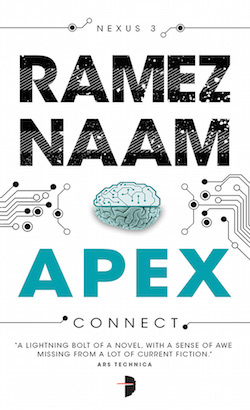
The 40th Norwescon will happen over Easter weekend of 2017. If you’re a local sci-fi fan or author and you haven’t attended, you should save the date. There’s a whole community out there just waiting for you to join.
